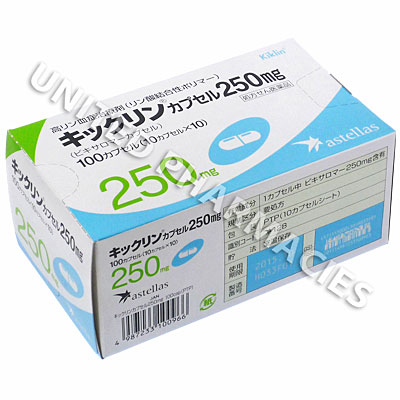Customers also like
Cipril (Lisinopril) - 10mg (10 Tablets)
our best price : $9.24
Lasix (Frusemide) - 40mg (15 Tablets)
our best price : $3.69
Burinex (Bumetanide) - 1mg (100 Tablets)
our best price : $30.19
Carnitene (L-Carnitine) - 1g/5mL (5 x 5mL Ampoule)
our best price : $11.45
Nexium (Esomeprazole Magnesium) - 40mg (28 Tablets)
our best price : $17.60
Furosemido (Furosemide) - 20mg (10 Tablets)
our best price : $3.05
Description
Kiklin (Bixalomer) is a medicine used to treat dialysis patients (who have chronic renal failure) for a condition called hyperphosphatemia, in which abnormally high amounts of phosphates occur in the blood. A buildup of phosphorus can affect patients who are receiving kidney dialysis, and it may be caused by an insufficient excretion of phosphorus in the urine. This may lead to renal osteodystrophy, and can even increase the risk of artery calcification and cardiovascular side effects. The goal of treatment with this drug is to reduce the phosphate concentration in the blood by encouraging the excretion of phosphorus in the feces.
Your physician will determine the correct dosage of Kiklin (Bixalomer) that is required based on your individual circumstances. This drug is in capsule form, and the medicine content for each individual capsule is 250mg. Some physicians have instructed their patients to begin treatment with 2 capsules taken 3 times per day. It is normally administered right before the consumption of each main meal of the day. However, the physician providing medical care may decide to adjust the dosage, with factors such as the blood phosphorus level being taken into account. Never exceed the dosage that your physician tells you to take.
Some reactions have been reported by patients taking Kiklin (Bixalomer) and a list of examples is given here:
- Indigestion
- Constipation
- Feeling bloated
- Abdominal symptoms
- Harder than normal feces
Promptly notify your physician if side effects are noticed during the course of treatment. There have been reports of serious reactions in patients treated with this medicine, however, this is a less common occurrence. You will require immediate medical treatment or hospitalization if you notice ischemic enterocolitis symptoms, ulceration, signs of gastrointestinal hemorrhage or any other significant and dangerous side effects which have not been mentioned in this paragraph.
You will most likely be directed by your physician to reduce or restrict the amount of phosphorus consumed. Special instructions related to diet may be provided, and it is vital that you strictly adhere to all special dietary requirements .
Monitoring of your bowel movements on a daily basis may be necessary.













